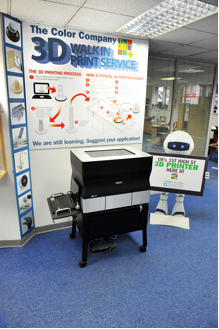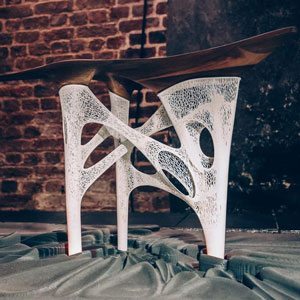The RepRap 3D printing movement originated in Bath, UK, from where the ripples of opportunity have flowed outwards across oceans afar. The UK, however, now hosts a growing number of businesses that offer the provision of 3D printing as a service and they come in a large variety of guises. Some businesses are everyday folks, with a printer on their desk, others are multi-million pound enterprises. So what is the market like for 3D printing provision in the UK right now? What competition and opportunities are there? Let’s take an in-brief look at the British market.
Amongst the variety of type of printing provision businesses Wesley Nevin has set up shop with Birmingham-based 3D Printman. The company is an example of the mid-range prosumer printer owner utilising their personal manufacturing machine for profit via 3D printing for applications that range from prototyping and basic end-use products. And of course, there are the figurines. Nevin offers ornamental 3D printed action figures and offers a range of files as well as accepting files from customers.

There is also a growing network of professional grade prototyping and product printing facilities open to the wider public, notably the UK’s FabLab network. 3D Hubs, the world’s largest network of home 3D printers, provides a platform for some one hundred 3D printers in London alone.

In partnership with the Royal Society for the encouragement of Arts, Manufactures and Commerce (RSA) FabLab London opened last month at 1 Frederick’s Place announcing it as London’s first FabLab ― however Lime Wharf London predates it, ascribed as a FabLab by the Manufacturing Institute, but either way the digital fabrication network is expanding in England’s vibrant commercial capital. As RSA co-director of Design Sophie Thomas told Wired last month: “Anyone living and working in central London who wants to learn new skills — from 3D technology to fixing their broken printer for longer use — can drop into the Hub and work with our technicians… We want to unlock hidden potential through the application of these digital technologies, hardware design, traditional fabrication principles, and sustainable design practices.”

Other examples of professional level printing service provision include 3D Creation Lab with their state-of-the-art Stratasys Objet Connex 260 multi-colour Polyjet printer. 3TRPD can boast a breadth and depth of output capacity with their industrial standard plastic sintering EOS EOSINT P365, P396, P730 and P760 and metal sintering from their EOSINT M270 and M280 that is almost unrivalled in the country. That’s some serious kit. Ogle Models & Prototypes is another well established service bureaux, along with IPF, CA Models and MNL who all offer broadening portfolios of platforms and years of expertise. Shropshire is home to 3D Alchemy, which offers a range of 3D printing technologies described as: “Fused Deposition Modelling for our ‘strong and durable‘ 3D printing service, Polyjet for our ‘fine detail‘ service, Z-Corp for our ‘full colour‘ 3D printing service and DMLS for 3D printing in Metals.“ The list goes on, with industrial grade printing appearing in more and more locations.
Among all this the young pioneers of 3D printing using prosumer grade printers, entrepreneurs establishing their businesses on the back of the mushrooming prevalence of 3D printers and bottleneck of publicity – here in late 2014 – night start to wonder where market demand begins and profit potential ends. There are a few consultancies in the UK that would be able to offer insight into that question such as Econolyst and CADventure.
This has, needless to say, been an article teeming with articulation of the range of British businesses that are now printing in three dimensions. It only touches the surface. There are many more. For Wesley Nevin and 3D Printman, much of the power of his business pays in the pleasure. He loves 3D printing. He would be 3D printing whether seeking profit from it or not. So he is printing for profit as well as pleasure. And printing with professionalism.
The gap between printing for fun and printing professionally is filled with all manner of altered attitudes and approaches ― service provision starts with the provision of a service: If your desktop 3D printer comes across a technical problem you can’t fix quickly when the deadline for getting a print out to customers; or if that quote for a given volume, material and colour is beaten by rivals that can easily be found elsewhere; or if your payment transaction provider lets you down – and so forth – the clear difference between printing for fun and provision of a service becomes self-evident.
Wesley told me that his large prosumer printer is soon going to be changed for two printers of higher resolution but smaller build area, selling the “big Z18 printer and going for 2 smaller better detailed ones that can perform PLA / ABS flexible / dissolvable and NINJA FLEX filaments.”
With his MakerBot Z18 Wesley has been able to start his own small business. Even before the RepRap wave of desktop 3D printers emerged, CNC milling and other digital manufacturing machines have been able to create craftspersons from abecedarian amateurs, and experienced entrepreneurs from budding businesspersons. But now the business potential for a beginner with what, to many, is simply a hobbyist interest is increasingly open: the enterprise potential of the personal production machine.

Leave A Comment